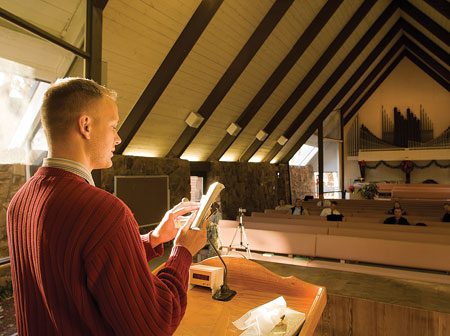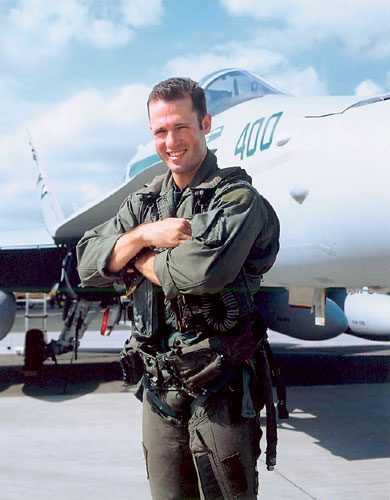By Charlene Winters

Joseph L. “Ren” Allred, the new director of alumni campus activities, brings with him a deep love for BYU and 25 years of military experience. Allred will supervise the Student Alumni Association and all alumni-related activities on campus.
Joseph L. “Ren” Allred loved working for the Army so much that when he retired as a lieutenant colonel in 1996 after a 25-year career, he accepted related work in Eastern Europe with the U.S. State Department as the director of public affairs for the military stabilization program in Bosnia.
But even stronger than his love of the military is his love for his family and for BYU. Last August, when the Alumni Association invited him to become director of alumni campus activities, he snatched the job gladly.
“I am thrilled to be here. I wanted to be with my family and I wanted my vocation to continue at BYU,” he explains. “Although I did not attend BYU, I became grafted onto the BYU tree through my marriage to Kathy Noble, who did graduate from BYU. Our children of college age have all gone to BYU, and part of my work with the military was to be chair of the Department of Military Science at BYU [1993–95].”
Allred says he is particularly happy to be at the university because he views its environment as a haven for education and an ideal way of looking at life. “I have seen much of the world, and BYU is a wonderfully unique place to be. What people glean from BYU can be taken to whatever environments they have to face. I had an ideal job with the military, and I have an ideal job now. Not too many people can have two completely separate careers and embrace them both. I feel very fortunate.”
As part of his new responsibilities, Allred directs all alumni-related activities on campus. What particularly intrigues him, he says, is the chance to work with alumni of all ages. That opportunity includes supervising the Student Alumni Association, an alumni-in-residence program that concentrates on activities that involve networking, education, and career programs for students. At the other end of the age scale is the Emeritus Association, which focuses on alumni who graduated from BYU at least 40 years ago. Also under his charge is the Single Alumni Program and an association for medical professionals called Collegium Aesculapium.
“We are dedicated to meeting the needs of alumni,” he says. “We look for ways to make them feel good about BYU and make them feel valued whenever they come to campus, whether it is for Commencement, Homecoming, reunions, or other BYU events.”
Allred commands a staff of four full-time employees and four students who work year-round on projects that range from Semester Survival Kits (which parents can give freshmen and transfer students during their first semester at BYU) to the Senior Celebration–a free party with entertainment, food, and prizes for graduating seniors.
“I see this department’s role as four-fold,” he says. “First, we are here to help fill the needs of the campus alumni programs. This includes supporting programs through the different colleges. Second, we link parents and students to the institution. Third, we help students learn about alumni activities and programs they will have the opportunity to be involved in while here. Fourth–and this is probably the key aspect–we help students learn the value of giving back to the institution in the form of replenishment donations. These aid other students, and we want every student to taste the joy of giving–not only in time and talents, but also, in a small way, of their resources.”
While he runs his office with the efficiency of the military life he embraced for a quarter of a century, Allred’s approach also emphasizes warmth and affection. He attributes his leadership style to the years he spent working with civilians, where flexibility was as important as discipline.
“My military idol has been Omar Bradley, who was a World War II general of the Army and later was the first chairman of the Joint Chiefs of Staff. He was my idol for military leadership. He was known as the soldier’s general because he was concerned about the life of the soldier. I patterned my approach to his by being attentive and compassionate to those I serve.
“I pinch myself every day,” he adds. “Every day is a new experience, and everything I had hoped for is certainly coming true with this responsibility.”









